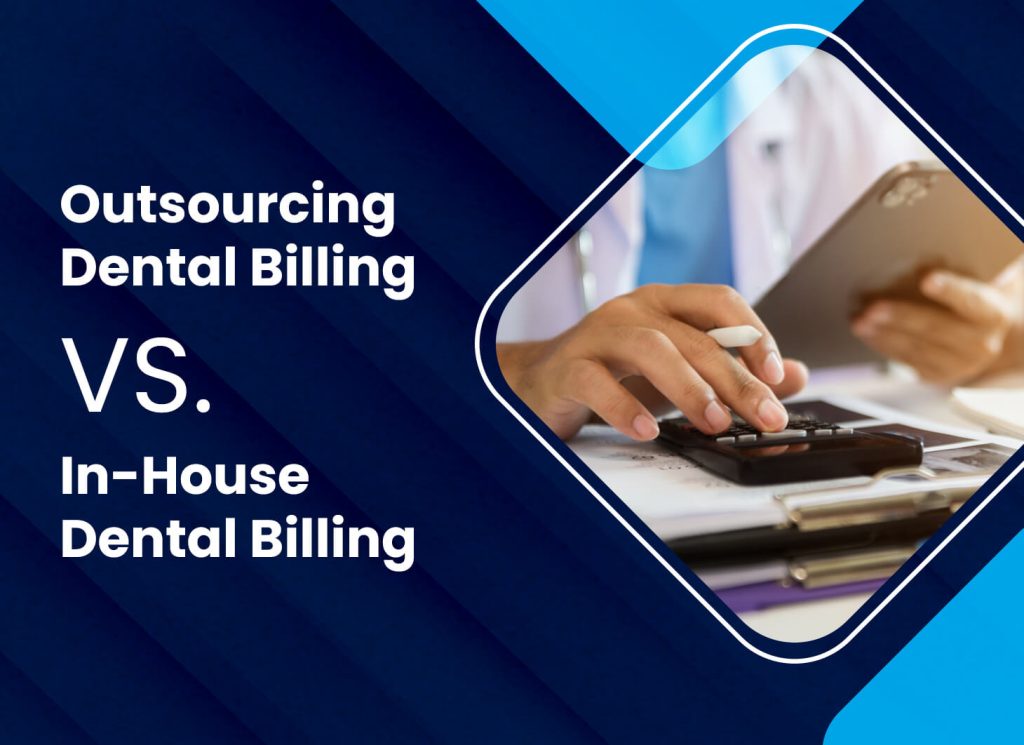When it comes to managing dental billing, practices have two main options: outsourcing it to a third-party provider like Capline Dental Services or handling it in-house. Each approach carries its own set of advantages and disadvantages.
Outsourcing dental billing is a strategic choice for dental practices focused on delivering exceptional patient care. It liberates valuable time and grants access to cutting-edge technology that may not be readily available in-house. However, outsourcing can also incur costs and potentially reduce control over the billing process.
Conversely, handling dental billing in-house provides practices with more control over the process and may prove to be cost-effective in the long term. Nonetheless, this approach can be time-consuming and require substantial investments in technology and staff training.
Let's delve into each option in detail:
Outsourcing Dental Billing:
Advantages:
- Cost Savings: Outsourcing dental billing often leads to cost savings. Dental billing companies possess specialized expertise and resources, allowing them to efficiently perform billing tasks, thereby saving on staffing costs, software expenses, and training.
- Expertise: Dental billing companies specialize in billing and coding for dental procedures. They stay updated with the latest changes in regulations, insurance policies, and billing codes, ensuring accuracy and compliance. This expertise results in fewer billing errors and faster reimbursement for dental offices.
- Time Savings: Outsourcing billing tasks significantly enhances the productivity and efficiency of dentists and their staff, enabling them to focus more on providing top-notch patient care. This translates to improved patient satisfaction and overall practice performance.
- Scalability: Dental practices benefit from outsourcing their billing operations by gaining the flexibility to scale their operations according to their unique needs, fluctuations in patient volume, or expansion plans. Outsourcing allows for easy adjustment without the need for additional staff, aiding in cost-cutting and ensuring efficient billing processes while practitioners focus on core activities.
- Improved Cash Flow: Outsourcing dental billing can significantly enhance cash flow for practices. Prompt and accurate billing reduces the time taken to receive payments from insurance companies and patients.
Disadvantages:
- Loss of Control: Outsourcing dental billing streamlines practice finances, but relinquishing control over the process requires clear communication and transparency. Working closely with the outsourced company and clearly outlining the practice's needs can help ensure the smooth handling of billing.
- Confidentiality Concerns: Sharing patient data with a third-party billing company raises concerns about confidentiality and data security. It's crucial to choose a reputable company like Capline with robust security measures in place.
In-House Dental Billing:
Advantages:
- Control: Managing billing in-house provides dentists with direct control over the process, enabling them to tailor procedures to meet the specific needs of their practice and address any concerns effectively.
- Familiarity: In-house staff possess in-depth knowledge of patients, procedures, and unique billing requirements, enabling them to execute billing processes with personalized attention and utmost efficiency.
- Immediate Access: In-house billing allows dentists to promptly address patient inquiries, insurance issues, and billing-related concerns, fostering patient satisfaction and trust in the practice.
- Cost: Outsourcing billing can streamline operations and reduce costs. By partnering with a reliable billing service provider like Capline, dental offices can save money on software, staff training, and other resources while ensuring accurate and timely billing.
Disadvantages:
- Expertise Requirements: Billing and coding in the dental industry are complex and subject to frequent changes. Maintaining staff expertise and staying updated with regulations can be challenging and time-consuming.
- Risk of Errors: Without specialized expertise, in-house billing carries the risk of errors that can lead to delayed payments, denials, or compliance issues.
Ultimately, the decision to manage dental billing in-house or outsource it depends on factors such as the practice’s size, resources, expertise, and preferences. In-house billing offers control, familiarity, and customization opportunities, while outsourcing provides cost savings, expertise, and scalability. Some dental practices find outsourcing to be a practical approach, while others prefer the control and customization of managing billing internally.
